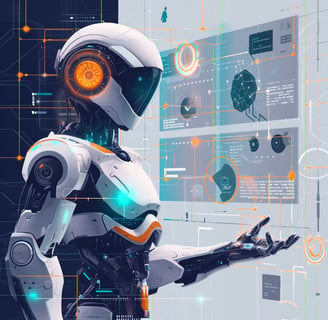
AI-Powered Process Automation: Transforming Business Efficiency and Innovation
Discover how AI-powered process automation is revolutionizing business efficiency and innovation in our latest blog post. Learn how companies are leveraging this technology to streamline operations, increase productivity, and drive growth. Find out how you can stay ahead of the competition by embracing this cutting-edge solution.
Waqar Jadoon
2/26/20247 min read


Evolution of AI in Automation
Over the years, the Evolution of AI in Automation has been marked by significant advancements and transformations. From simple rule-based systems to complex machine learning algorithms, AI has revolutionized the way tasks are automated in various industries. The evolution of AI in automation has enabled organizations to streamline processes, reduce errors, and enhance productivity like never before.
The continuous Evolution of AI in Automation is driven by the need for efficiency, accuracy, and scalability in business operations. As AI technologies become more sophisticated, businesses are increasingly adopting automation solutions to improve decision-making, optimize resource allocation, and deliver superior customer experiences. The journey of Evolution of AI in Automation showcases the potential for innovation and growth in an increasingly digitized world.
Benefits of AI in Business Process Automation
AI-Powered Process Automation offers numerous benefits to businesses striving for efficiency and productivity. By incorporating artificial intelligence into various business processes, organizations can streamline operations, reduce manual errors, and increase overall productivity. AI algorithms can analyze vast amounts of data in real-time, enabling businesses to make data-driven decisions swiftly and accurately.
Moreover, AI in Business Process Automation enhances customer satisfaction by providing personalized experiences and prompt responses. Through the use of AI-powered chatbots and virtual assistants, businesses can offer round-the-clock customer support, ensuring a seamless experience for their clients. Additionally, by automating repetitive tasks and workflows, employees can focus on more strategic initiatives, boosting overall efficiency and innovation within the organization.
Technologies Enabling AI Automation
Enabling the seamless integration of AI in automation processes, technologies such as machine learning algorithms and natural language processing are playing a pivotal role in enhancing business efficiency. These advanced tools allow for the automation of repetitive tasks and decision-making processes, leading to a reduction in operational costs and increased productivity. By harnessing the power of AI, companies can streamline their operations, optimize resource allocation, and deliver a higher level of customer service, thereby gaining a competitive edge in the market.
Moreover, the combination of AI and automation technologies enables businesses to make data-driven decisions in real-time, transforming complex data sets into actionable insights. By leveraging predictive analytics and cognitive automation, organizations can forecast trends, identify bottlenecks, and proactively address potential issues before they escalate. This proactive approach not only enhances operational efficiency but also empowers businesses to adapt quickly to changing market dynamics and customer preferences, ensuring sustained growth and profitability.


Applications of AI in Process Automation
Artificial Intelligence (AI) has revolutionized process automation across various industries, offering a myriad of applications that enhance efficiency and productivity. Technologies enabling AI automation, such as machine learning and natural language processing, have empowered businesses to streamline processes and make data-driven decisions with unparalleled accuracy. From automating repetitive tasks to predicting customer behavior, AI has become a cornerstone in optimizing workflows and driving innovation in process automation.
One key application of AI in process automation is predictive maintenance, where advanced algorithms analyze sensor data to predict when equipment may fail, allowing for timely maintenance interventions and minimizing downtime. By leveraging technologies enabling AI automation, organizations can proactively address issues before they escalate, saving costs and enhancing operational efficiency. Additionally, AI-powered chatbots are transforming customer service by providing instant responses to queries and personalized assistance, improving customer satisfaction and engagement.
Challenges of Implementing AI in Automation
Implementing AI in automation presents a series of challenges that businesses need to navigate effectively. One significant obstacle is the intricate nature of integrating AI into existing processes seamlessly. Given the diverse applications of AI in process automation, adapting the technology to suit specific business needs requires meticulous planning and execution. It demands a comprehensive understanding of both the technical aspects and the operational requirements to ensure a smooth transition.
Furthermore, another critical challenge lies in the data quality and availability necessary for AI to function optimally in automation tasks. Without accurate and relevant data, the effectiveness of AI applications can be compromised, hindering the automation process. Companies must establish robust data collection mechanisms and invest in data management strategies to ensure that AI-powered automation operates at its full potential. By addressing these challenges proactively, organizations can pave the way for successful integration of AI in automation, unlocking its transformative potential.
Future Trends in AI-Powered Automation
As the landscape of AI-powered automation continues to evolve, businesses are poised to encounter new challenges in implementing these technologies. One such challenge is the ongoing need for data privacy and security measures to protect sensitive information. With the increasing reliance on AI algorithms to automate processes and decision-making, ensuring the integrity and confidentiality of data will be paramount for organizations seeking to leverage the full potential of automation technologies.
Moreover, the rapid pace of technological advancement in AI poses a challenge in terms of talent acquisition and upskilling for workforce readiness. As automation technologies become more sophisticated, the demand for skilled professionals who can develop, implement, and maintain these systems will only continue to grow. Businesses must prioritize investing in training and development programs to equip their employees with the necessary skills and knowledge to harness the power of AI-powered automation effectively.


Implementing AI-Powered Automation in Your Business
When considering the integration of AI-powered automation into your business operations, it is essential to stay informed about future trends in this rapidly evolving field. Embracing advancements such as predictive analytics, natural language processing, and machine learning can significantly enhance the scalability and efficiency of your automated processes. Aligning your automation strategies with upcoming technologies ensures that your business remains competitive and at the forefront of innovation.
Moreover, gaining a deep understanding of how AI-powered automation can streamline workflows and boost productivity within your organization is key to successful implementation. Investing in continuous training for your workforce to leverage these technologies effectively and adapt to changing automation trends will set the foundation for sustainable growth and operational excellence.
Emerging Innovations in AI Automation
By Implementing AI-Powered Automation in Your Business, you can stay ahead of the curve and remain competitive in a rapidly evolving landscape. AI innovations such as natural language processing, machine learning algorithms, and robotic process automation are transforming the way businesses operate. These advancements enable faster decision-making, improved accuracy, and increased productivity, ultimately leading to enhanced customer satisfaction and organizational efficiency.
Moreover, the integration of AI technologies like computer vision and predictive analytics in process automation is reshaping traditional business models and opening up new opportunities for growth. By leveraging these emerging innovations, organizations can streamline their operations, reduce costs, and drive innovation across various industry sectors. As AI continues to evolve, businesses that embrace these technological advancements will be better positioned to thrive in an increasingly digital world.
Measuring the Success of AI-Powered Automation
When assessing the success of AI-powered automation initiatives within a business setting, key performance indicators (KPIs) play a crucial role. These metrics allow organizations to quantitatively measure the impact and effectiveness of AI implementations. Metrics such as cost savings, process efficiency improvements, error reduction rates, and customer satisfaction levels are commonly used to gauge the success of AI automation projects. By analyzing these KPIs, businesses can objectively evaluate the return on investment and the overall contribution of AI technologies to their operational efficiency and productivity.
Furthermore, tracking the alignment of AI-powered automation outcomes with strategic business objectives is essential in determining success. Organizations need to ensure that AI implementations are directly linked to broader business goals, such as revenue growth, market expansion, or enhanced customer experience. By evaluating how AI automation aligns with these strategic objectives, companies can assess whether the technology is delivering the intended results and driving the organizational progress in the desired direction.


Enhancing Business Efficiency with AI Automation
In the competitive landscape of today's business environment, the integration of AI automation has become a pivotal strategy for enhancing operational efficiency. By leveraging artificial intelligence technologies, businesses can streamline processes, reduce manual errors, and accelerate decision-making. This results in significant cost savings and improved productivity, allowing organizations to reallocate resources towards more strategic initiatives.
Artificial intelligence plays a crucial role in optimizing workflow management, data analysis, and customer interactions, leading to enhanced business outcomes. With AI automation, businesses can personalize customer experiences, forecast market trends, and automate repetitive tasks, fostering a culture of continuous improvement and innovation. By embracing AI-driven solutions, organizations can stay ahead of the curve, adapt to evolving market dynamics, and drive sustainable growth in today's rapidly changing business landscape.
Featured Questions:
What is the significance of AI in automation for businesses?
AI in automation helps businesses streamline processes, reduce errors, improve productivity, and make data-driven decisions.
What are some of the benefits of AI in business process automation?
Some benefits include cost savings, increased efficiency, improved accuracy, faster processing times, and enhanced customer satisfaction.
What technologies enable AI automation in business?
Technologies such as machine learning, natural language processing, robotic process automation, and cognitive computing enable AI automation in business.
How can AI be applied in process automation?
AI can be applied in various processes such as data entry, customer support, inventory management, decision-making, and predictive analytics.
What are the challenges of implementing AI in automation?
Challenges include high initial costs, resistance to change, data privacy concerns, integration issues, and the need for skilled personnel to manage AI systems.
What are some future trends in AI-powered automation?
Future trends include the rise of AI-powered chatbots, increased use of AI in cybersecurity, more advanced data analytics, and personalized customer experiences.
How can businesses implement AI-powered automation?
Businesses can implement AI-powered automation by conducting a thorough assessment of their processes, selecting the right AI tools, training employees, and continuously monitoring and optimizing AI systems.
What are some emerging innovations in AI automation?
Emerging innovations include the use of AI in supply chain management, automated content creation, personalized marketing campaigns, and autonomous vehicles.
How can the success of AI-powered automation be measured?
The success of AI-powered automation can be measured through key performance indicators such as cost savings, productivity gains, error reduction, customer satisfaction metrics, and revenue growth.
How does AI automation enhance business efficiency?
AI automation enhances business efficiency by automating repetitive tasks, improving decision-making processes, increasing productivity, reducing errors, and enabling businesses to focus on strategic initiatives.
About the Author:
Waqar Jadoon, with 28 years in aviation supply chain management, holds an MBA and a software engineering degree. Renowned for streamlining operations and integrating AI and data analytics, he blends technical and business expertise to drive industry innovation. Waqar champions sustainable practices and technological advancements, shaping the future of aviation logistics.


Location
Business Center 1, M Floor. The Meydan Hotel, Nad Al Sheba, Dubai U.A.E
Hours
Monday - Sunday 08:00am - 08:00pm
Contacts
Phone: +971566121732 info@vantageplusanalytics.com
waqarjadoon@vantageplusanalytics.com
FAQ
